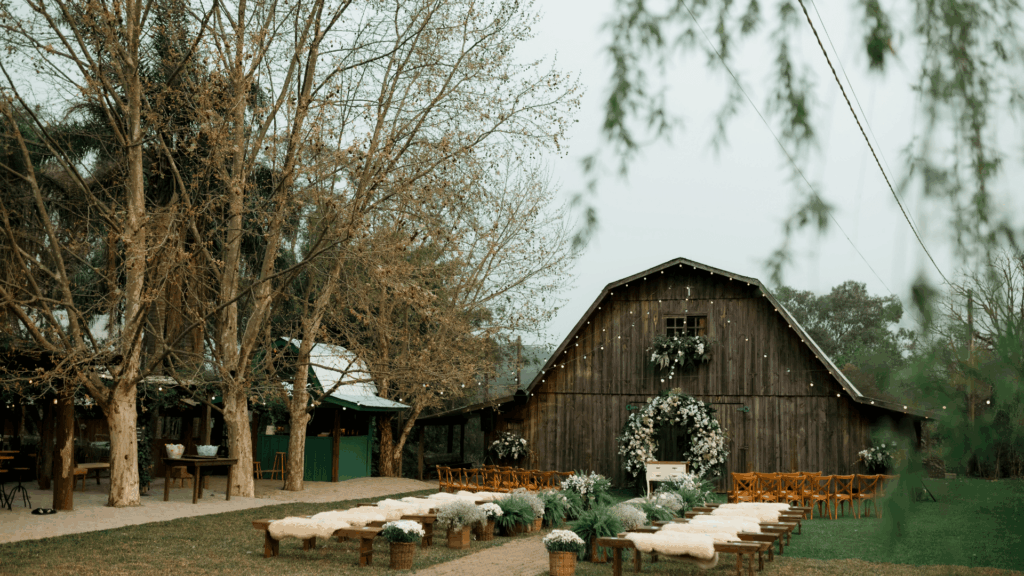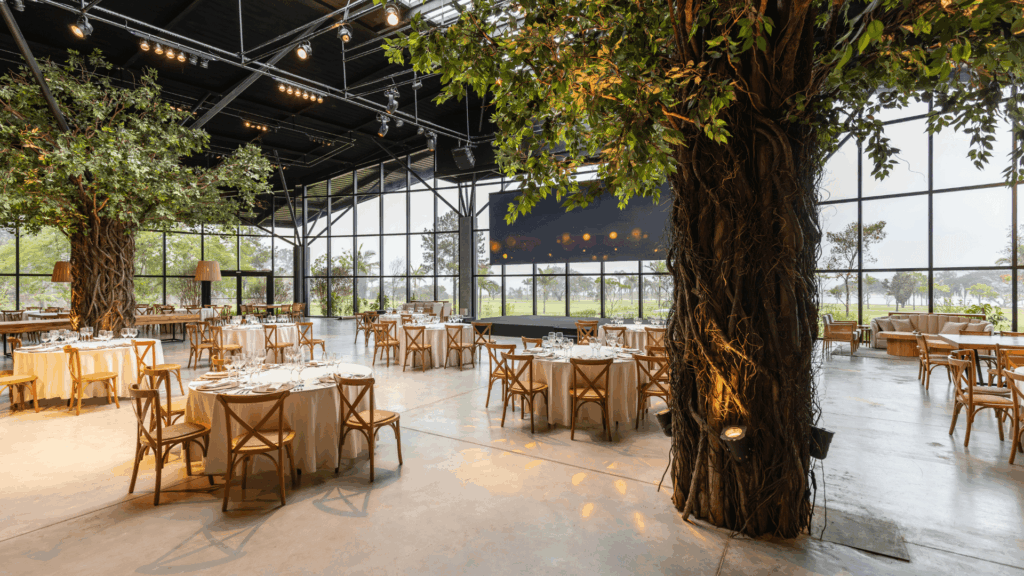Wedding Venue Management: 5 Strategies for Success
Last Updated: October 2025. This article has been updated with the latest wedding industry statistics, trends, and marketing strategies to ensure you're getting current, actionable information that works in today's market.

Running a wedding venue? Then you already know it’s about way more than just having a pretty space.
In fact, it’s about creating systems that actually work, marketing that brings in your dream couples, and operations that don’t leave you scrambling every weekend wondering how you’re going to pull it all off.
Whether you’re managing a rustic barn, an elegant ballroom, or a garden estate, I’m breaking down five strategies that’ll help you streamline your venue management, stand out when everyone else is just blending in, and build a business that runs smoothly without constant chaos.
Ready? Let’s do this.
TL;DR: Wedding Venue Management in 2025
Short on time? Here’s what you need to know:
The Bottom Line: Wedding venue success comes down to five things: customer service that gets people talking, systems that keep you organized, a brand that stands out online, vendor partnerships that expand your reach, and staying current with what couples actually want right now.
What’s Changed in 2025: Couples are prioritizing sustainability (45% want eco-friendly options), micro weddings are everywhere (48% are considering smaller celebrations), and most couples (94%) start their venue search online. If your SEO and social media aren’t strong, you’re basically invisible.
Start Here: Pick one thing to improve this month. Set up a simple CRM system, update your website with fresh photos, or create one sustainability initiative. Small, consistent steps beat overwhelming overhauls every single time.
Want help? Download our free Wedding Venue Operations Checklist to organize your next 90 days and actually implement these strategies.
Why Wedding Venue Management Actually Matters
Here’s the thing: couples spend around 40% of their total wedding budget on their venue. Therefore, that’s not just a transaction. That’s a massive investment in an experience they’ve been dreaming about.
When your venue management is tight, you deliver that experience every time. However, when it’s messy? Couples can tell. In fact, in an industry where 87% of couples use platforms like Pinterest and The Knot to plan their weddings, one mediocre review can tank your bookings.
Consequently, strong venue management means:
- Couples leave raving reviews that bring you more bookings
- You’re not constantly putting out fires
- You can actually scale without burning out
- Your marketing converts because your systems back up what you’re promising
So let’s talk about how to make this happen.
Strategy #1: Deliver Customer Service That Gets You Referrals

Word-of-mouth referrals? That’s the lifeblood of your venue business. But here’s what exceptional customer service actually looks like – it’s not about being overly formal or stuffy. Instead, it’s about being genuinely helpful and making couples feel like their wedding matters to you.
How to Provide Excellent Customer Service at Wedding Venues
First, respond fast. Like, within 24 hours fast. Ideally within a few hours. When couples reach out, they’re excited and they’re comparing venues. Therefore, speed wins.
Next, listen more than you talk. Ask questions about their vision, what they’re worried about, what they absolutely need. Then, take notes. Reference them later in your follow-ups.
Additionally, personalize everything. For instance, after a venue tour, send an email mentioning the specific things they loved. Include a photo of that ceremony spot they couldn’t stop talking about.
Moreover, set clear expectations. Walk them through your process, what happens next, and when they’ll hear from you. After all, uncertainty makes people anxious, and anxious couples ghost.
Finally, go the extra mile. Recommend vendors who match their vibe. Send them a list of nearby hotels for out-of-town guests. These little touches matter.
Think you don’t have time for this? I get it. That’s exactly why you need to set up systems with SOPs that make personalization part of your process, not something extra you’re trying to squeeze in.
Why This Works
When couples feel valued and heard, they become your biggest cheerleaders. In turn, they tell their engaged friends about you, they leave glowing reviews, and they remember your venue as the place where someone actually cared about making their day perfect.
Ultimately, that’s the kind of reputation that keeps you booked.
Strategy #2: Build Systems That Keep You Organized

If you’re constantly digging through your inbox looking for contracts, accidentally double-booking dates, or forgetting important client details, we need to talk about your systems.
Here’s the truth: organization isn’t about being perfect or color-coding everything (unless that’s your thing). Rather, it’s about having a framework that catches mistakes before they turn into disasters.
Your Essential Systems
First, get a centralized client management system. For example, use a CRM like HoneyBook, Dubsado, or even Airtable to keep every client detail, contract, payment, and conversation in one searchable place. As a result, no more “wait, where did they say they wanted that?” moments.
Second, create event timeline templates. Build a master checklist that includes setup times, vendor arrivals, ceremony start, breakdown – everything. Then customize it for each couple instead of starting from scratch every time.
Third, pick your communication channels and stick to them. Email? Text? Client portal? Whatever you choose, be consistent. In addition, update couples regularly so they’re never sitting there wondering what’s happening.
Finally, set up a simple document system. Create folders for Contracts, Vendor Info, Event Timelines, Client Questionnaires, and Invoices. This literally takes 10 minutes and will save you hours of panicked searching.
Need help building these systems? Quarterly planning gives you dedicated time to actually build the infrastructure your venue needs instead of just wishing it existed.
Pro Tip: Block Out CEO Time
Here’s what changed everything for me and my clients: schedule a CEO day once a month to work ON your business instead of just IN it.
During this time, you can refine your systems, look at what’s actually working, and fix what’s not. In fact, this one habit will transform you from a reactive venue owner into someone who’s actually building something sustainable.
Strategy #3: Create a Brand That Stands Out

Your venue isn’t just a space. It’s a brand. And when 94% of couples start their search online, your digital presence needs to tell them exactly why you’re the right choice.
Building Your Brand Identity
Get specific about what makes you different. Are you the sustainable venue? The all-inclusive option that takes decision fatigue off the table? The historic estate with modern amenities? Stop trying to be everything and own your angle.
Invest in professional photos. And I don’t just mean pretty ceremony shots. Show the getting-ready spaces, the cocktail hour setup, the dance floor when it’s packed with guests. Help couples see their entire day at your venue.
Tell stories, not just features. Instead of “Our venue has a bridal suite,” try “Our bridal suite has floor-to-ceiling windows so your photographer can capture those getting-ready moments in the most beautiful natural light.”
See the difference?
Show up consistently. Your marketing needs high-quality visuals across your website, social media, and venue listings. Consistency builds trust, and trust leads to bookings.
Master Pinterest for Long-Term Visibility
Want to reach couples where they’re already spending hours dreaming about their wedding? Pinterest marketing for wedding pros is seriously underrated for venue visibility.
Couples use Pinterest throughout their entire planning journey, which makes it one of the most effective long-term marketing channels you have.
SEO Isn’t Optional Anymore
Make sure your website shows up when couples search for “wedding venues near [your city],” “outdoor wedding venues in [region],” or “all-inclusive wedding packages [location].”
Effective SEO strategies help wedding venues rank higher and attract qualified leads without constantly paying for ads.
Strategy #4: Build a Network That Expands Your Reach

No venue exists in a bubble. The vendors you partner with? They’re not just people you work alongside – they’re your extended marketing team.
Why Networking Actually Works
Better service for your couples. When you have a roster of reliable caterers, florists, and photographers, your events run smoother. Couples notice, and they tell their friends.
More bookings from referrals. Vendors send clients to venues they trust. If a planner loves working with you, they’re going to recommend you over and over.
Cross-promotion opportunities. Feature each other on social media, create preferred vendor lists, offer package deals. Everyone wins.
You stay in the loop. Regular conversations with other pros keep you connected to trends, pricing changes, and what couples are actually asking for.
How to Build Your Network
Show up to local wedding industry events. Not just to collect business cards, but to actually build relationships with people you’d want to work with.
Create a preferred vendor list – but make it real. Only include people you genuinely trust and who share your values. Quality over quantity always.
Collaborate on styled shoots. This creates fresh content for everyone and deepens your relationships with vendors you want to work with more often.
Stay in touch. A quick “Hey, how’s your season going?” text goes a long way. Don’t just reach out when you need something.
Strategy #5: Stay Ahead of Wedding Industry Trends

Couples want fresh, current experiences. If your venue feels like it hasn’t changed since 2015, you’re losing bookings to competitors who are evolving with the market.
Top Trends to Watch in 2025
Sustainability isn’t optional anymore. 45% of couples now prioritize eco-friendly options for their weddings. Add recycling programs, switch to energy-efficient lighting, set up composting, and partner with local sustainable vendors.
These sustainable wedding practices aren’t just nice-to-haves anymore – they’re what couples expect.
Micro weddings are here to stay. 48% of couples are considering smaller celebrations, and that number keeps growing. Create packages specifically for 20-50 guest events with pricing that actually makes sense for intimate weddings.
Technology integration is expected. Virtual venue tours, online booking, digital contracts – couples want a seamless digital experience from the first inquiry to their wedding day.
Authenticity over perfection. Couples want to see real weddings at your venue, not just staged photoshoots. Show the genuine moments and the actual vibe of your space.
Give them options. All-inclusive packages are great for some couples. A la carte works better for others. Don’t force everyone into the same box.
According to The Knot’s 2025 Trends Report, couples are prioritizing guest experience above everything else. Think about how your venue creates memorable moments for everyone there, not just the couple saying “I do.”
FAQ: Your Wedding Venue Management Questions Answered
Focus on three things: getting found (SEO, social media, directory listings), converting inquiries (fast responses, easy booking process, great tours), and getting recommended (exceptional service, vendor relationships).
The biggest gap I see? Follow-up speed. Couples tour multiple venues in one weekend and make decisions fast. If you wait 3-4 days to send a proposal, they’ve already booked somewhere else.
HoneyBook, Dubsado, Rock, Paper, Coin, and Aisle Planner are all popular options. HoneyBook is usually the easiest to learn. Dubsado gives you more customization if you want to get detailed.
But here’s the truth – pick one and actually use it. A simple system you use every day beats a fancy system you ignore.
Industry data shows 44.6% of venues spend $1,000 or less per month on marketing, while high-performing venues typically invest $2,500 or more.
Start with what you can afford, but prioritize high-ROI channels like SEO, social media, and your Google Business Profile before paying for directory ads.
If budget’s tight, focus on organic strategies first. Pinterest and Instagram are free and incredibly effective for venues.
Start with the visible stuff: LED lighting, composting partnerships with your florists, clearly labeled recycling bins, digital contracts instead of paper, local catering vendors.
Then tell people about it on your website and social media. You don’t need to be perfect – 45% of couples prioritize eco-friendly options, so even small changes matter. Learn more about sustainable wedding practices you can implement right now.
Three big ones:
Slow follow-up. Speed matters. Aim for same-day responses.
No systems. Running everything from your inbox and your memory leads to mistakes, double bookings, and total burnout.
Ignoring SEO. If couples can’t find you on Google when they search “wedding venues near [your city],” you basically don’t exist to them.
Stop trying to be everything to everyone. Get really specific about your unique angle and own it.
Are you the sustainable venue? The all-inclusive option? The historic venue with modern amenities? The intimate garden that’s perfect for micro weddings?
Once you know, communicate it everywhere – your website, social media, listings. Couples aren’t looking for the “best” venue. They’re looking for the RIGHT venue for them.
It depends on your market. All-inclusive works great for couples who want simplicity and will pay for convenience. But some couples want creative control and prefer a la carte.
My suggestion? Offer both. Create 2-3 package tiers plus the option to customize. This way you’re serving different budgets and planning styles.
Super important. 87% of couples use Pinterest and Instagram during wedding planning. Your social media isn’t just marketing – it’s where couples discover you, imagine their wedding at your space, and decide whether to reach out.
Focus on Instagram for engagement and Pinterest for long-term SEO. Post consistently (2-3 times per week minimum), use local hashtags, tag your vendors, and share real weddings from your venue.
Set clear expectations from the start with detailed contracts and timelines. Communicate regularly so couples never feel left in the dark. When issues come up, listen first, validate their concerns, then problem-solve together.
Here’s what I’ve learned: most “difficult” clients are actually just anxious clients who feel unheard. Better communication prevents 90% of these situations.
Yes. Full stop. This is one of the highest-ROI investments you can make.
Couples make decisions based on what they see, and iPhone photos don’t cut it. Professional photos showcase your venue’s best angles, lighting, and potential in a way that makes couples say “yes, that’s the one.”
Budget for a professional shoot at least once a year, ideally showcasing different seasons or styles.
Create specific packages for off-peak times. Weekday discounts, Sunday brunch weddings, Friday evening micro wedding packages – market these to couples with smaller budgets or those who want something more intimate.
Quarterly planning helps you strategize these promotions ahead of time instead of scrambling when you notice gaps in your calendar.
How to Improve Wedding Venue Operations
Wedding venue management isn’t about doing everything perfectly. It’s about building systems that work, showing up consistently, and creating experiences that make couples want to tell everyone they know about you.
Pick one area from this guide and take action this week. It could be finally setting up that CRM system. Or updating your website with fresh professional photos. You might even start by reaching out to three vendors to strengthen those relationships.
Whatever it is, just start.
Ready to improve your wedding venue operations? Download our free Wedding Venue Operations Checklist to organize your next 90 days and set yourself up for sustainable growth.
You’ve got a beautiful venue. Now let’s build a business around it that actually supports the life you want.
About Boda Bliss: I help wedding professionals and creative entrepreneurs build sustainable systems and marketing strategies so they can streamline operations, scale with ease, and show up consistently. I’m not a marketing agency – I’m your systems and marketing partner. Learn more at bodabliss.com.
We make your systems and workflows easy breezy by working with you to create tailored, strategic solutions that save you time and make you money.
Ready to have someone streamline your systems?
Leave a Reply Cancel reply
© 2021-2026 BODA BLISS LLC. ALL RIGHTS RESERVED.
PRIVACY STATEMENT
Marketing Operations & Systems Setup for Wedding Professionals
Brand Photography by Lisa Kathan Photography
TERMS & CONDITIONS
Branding and Website Design by Emily Foster Creative